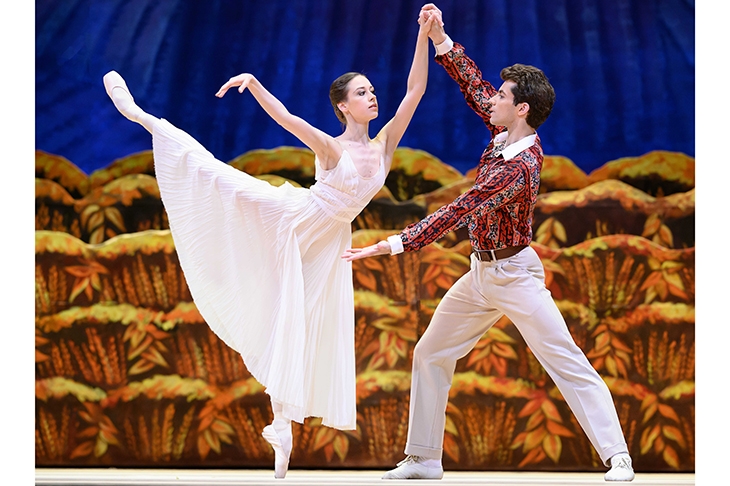The Bright Stream is a ballet about a collective farm. Forget everything you know about collectivism — the failed harvests, the famines — this is Soviet agriculture without mud or hunger. The Bright Stream, which opened in Leningrad in 1935, was Dmitri Shostakovich’s attempt to write a ‘socialist realist’ ballet. Our heroine is Zina (Daria Khoklova), the Bright Stream Collective’s Morale Officer. The curtain rises on a scene of sunny, saturated bounty: hay stooks, horns of plenty, pumpkins as big as cartwheels. Tractors soar across the backcloth like three flying ducks. This is collectivism in white tights and Liberty print.
The plot is batty. Ekaterina Krysanova and Ruslan Skvortsov are the Ballerina and the Classical Dancer arriving from Moscow to jolly along the Bright Stream’s harvest festival. Pyotr (Igor Tsvirko), agricultural student and husband to Zina, takes a shine to the Ballerina. So too does the Old Dacha-dweller (Yuri Ostrovsky). The Old Dacha-dweller’s wife (Anna Balukova with comedy bosom) fancies the Classical Dancer. Chaos ensues en pointe. Ingenious choreography, reimagined by Alexei Ratmansky in 2003, makes this a production of daffy charm and diabolo tricks.
The central quartet — Khoklova, Tsvirko, Krysanova, Skvortsov — are a joy. If the synchronicity between Khoklova and Krysanova is occasionally iffy, individually they are immaculate: Khoklova’s Zina is adorable, doll-like, romantic; Krysanova’s Ballerina lighter, sprightlier and, in her ‘breeches’ dance, more mischievous and tomfooling. The prize marrow award goes to Skvort-sov, who as the Classical Dancer dressed as a sylph (décolleté dress over hairy chest), dances a gorgeous tour de force. He minces on tippy-toes, he blushes, he swoons, he accidentally manspreads. You could hardly hear the orchestra for laughter. Bravo! Or should that be brava? Denis Savin as the Accordion-player is electric and elastic, all bendy back and bandy knees. The Bright Stream ends with a barnstorming barn dance as hearts and harvests runneth over.
Shostakovich was condemned all the same. It was thought the agricultural workers were not sufficiently realistic. You don’t say? As ballet The Bright Stream is delightful; as reportage it is hogwash; as history it is chilling.
Matthew Bourne’s Romeo and Juliet opens with the bloodied lovers on a mortuary slab. No hanging about. At its best this production pulses with lustful urgency, at its weakest it is a furious rush to the finish. There are three standout scenes — ballroom, balcony and fight — amid a dozen duds. Bourne, who has previously triumphed with Edward Scissorhands and Swan Lake, now recasts fair Verona as the Verona Institute, somewhere between borstal, boarding school and asylum. Bang, bang, stamp, clank go the boys and girls as sirens wail and whistles shrill. Fists are clenched, steps are deliberately flat-footed. Oh, for a satin slipper. There was high drama on press night as Mercutio (Reece Causton) sustained an injury in the opening scene. House lights up. Bourne on stage. The second cast Mercutio on his way. Ben Brown came on like a firecracker. His Mercutio was charged, flamboyant, drunk on youth. He flashed his kilt and seized Benvolio for a full-on snog. It is a young and fizzy cast drawn from Bourne’s company New Adventures.
The ballroom scene, now a school disco under a glitter ball, was fevered, anarchic and hormonal. The balcony kiss was beautifully done. Cordelia Braithwaite as Juliet and Paris Fitzpatrick as Romeo danced with the hesitant ecstasy of first love. Bourne has said he imagined Romeo as a Barron Trump-type with an overbearing big-bucks father. But in his mannered priggishness, Romeo was more like Adrian Mole with better moves. When he meets Juliet, his awkward ticks and jerking stiffness soften into something lyrical and free. Braithwaite danced Juliet’s pain, passion and pilgrim’s hands with grace and pathos.
However, without the central tension of Montague vs Capulet (here it’s just Tybalt vs everyone) you lose the driving conflict of the play. Juliet is presented as a victim of assault by Tybalt (Dan Wright) and the second act is driven by sexual trauma. Psychologically convincing, but grim.
The staging is cluttered and it’s easy to miss central moments — Romeo spotting Juliet across the dance floor, say — in the melée. The Prokofiev score has been chopped up and fret-sawed and relies overmuch on the Dance of the Knights. Without a full orchestra and hampered by the unsatisfactory acoustics of Sadler’s Wells, at times the playing had all the menace of a swanee whistle.







Comments